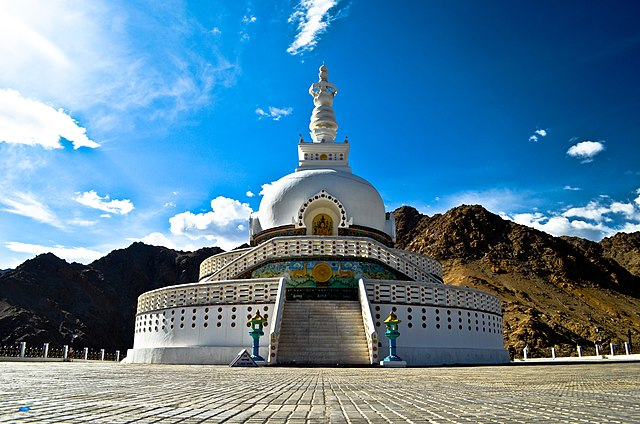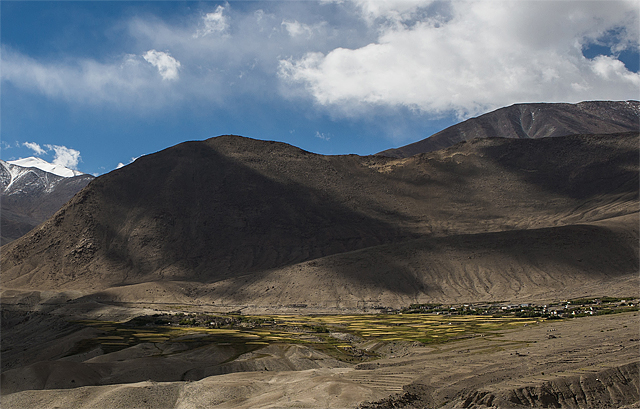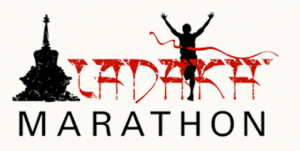The Ladakhi have taken to running. Younger people in particular are participating in the annual Ladakh Marathon, which was recently run for the sixth time. An article in USA Today last week described the enthusiasm for the race, held early each September right after the close of tourist season and before winter sets in.
Because of the extreme altitude, the race is divided into four different categories in order to satisfy runners with different abilities and tolerances for lower air pressures. The organizers of the marathon, Yangdu Gombu and her husband Chewang Motup Goba, have established an ultra-marathon of 72 kilometers, a standard marathon of 42 km, a half-marathon, and a short “Run for Fun” that is just 7 km long.

The three shorter marathons start at the Shanti Stupa in Leh and they are run along roads in the area of the small city, which is located at about 11,400 feet above sea level. The extreme event, however, the ultra-marathon, takes place on roads in the higher mountains. The course starts in the village of Khardung and continues over the Khardung La, a very high mountain pass. Thousands of people traveled to Leh for the four marathons this year, held over the weekend of September 9 – 10.
According to the news story, more than 2,000 people from outside Ladakh, from other parts of India plus several other countries, participated in one of the races. The Ladakhi were the most enthusiastic about the event. The 7 km fun run attracted 2,800 runners, of whom 2,500 were Ladakhis, primarily students from the local schools. The winners of the half marathon were also mostly local people.

The extreme run requires extra efforts by the marathon administrators to ensure the safety of the runners because of the elevation. The race starts at 14,000 feet in the mountains north of Leh at Khardung and proceeds up the road through the Khardung La, one of the highest motor roads passes in the world, which is about 4,000 feet higher (sources vary on its actual height and as to whether it is the highest road in the world).
Ms. Gombu, the race organizer, told the reporter that outsiders don’t normally make Khardung a destination of their travels so the villagers were unaware of tourism. But since the extreme event has started in their community, the administrators of the marathon events have been encouraging local people to open their homes to the September visitors and to prepare meals and hospitality for them. Some runners stay for just one day to acclimatize, but others stay for a few weeks before the race.
The administrators mobilize a lot of people to provide assistance for the runners, many of whom are not use to high-altitude running. Last month, 14 aid stations along the ultra-marathon route provided water, soup, energy drinks, sandwiches, and oxygen supplies to the 104 runners who participated. Ambulances were ready to respond to emergency situations that might have developed among the participants. The organizers ran a “sweep car” at the rear of the runners to pick up people who appeared to be flagging, and sometimes they even ran along beside them to make sure everything was all right. Gombu said, “All such runners, they don’t want to stop, so we have to make them stop sometimes.” They intervene when they perceive that the oxygen level of a participant is getting low.

A further complication for the organizers is that cell phone networks do not work in the mountains, so communications have to be maintained by radios. This year, one participant collapsed due to hypothermia and had to be taken to a medical camp. A helicopter would have been brought in if necessary.
The Ladakh Marathon fosters a strong feeling of national pride, the same as other sporting events that attract international competitors. The Ladakh Scouts, a branch of the Indian Army, views the race as a wonderful opportunity for Ladakhis—and as a fertile ground for recruiting men who perform well in a race. The Scouts “have been absorbing all the winners, and they are keen on recruiting the winner of the half marathon this year,” Ms. Gombu said. Her husband, Chewang Motup, feels that encouraging the young people of Ladakh to excel is extremely important. Most runners around the world would agree with Chewang’s sentiments.